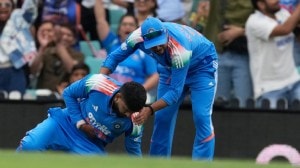From cymbals of harmony to those of discord
It had to happen. A petty dispute between two groups of harried commuters on Mumbai's local trains will now make it to the Union governme...

It had to happen. A petty dispute between two groups of harried commuters on Mumbai’s local trains will now make it to the Union government, thanks to the new Mumbai Railway Commissionerate.
Ten days after the commissionerate issued a directive to bhajan mandalis on local trains “to maintian decorum and not create trouble,” it scored its first hit arresting several of them and fining them Rs 500 each.
Predictably, the `victims’ have cited a religious defence, a 40-year-old solution, and have threatened to take the matter to former minister of state for railways Ram Naik, now a Cabinet minister in the Central government. The immediate provocation for that fight was the singing of bhajans by the Hindu group, to counter which the Muslim group sang qawwalis. But the two groups, who travel everyday on this train, are known for their rowdy behaviour and had been sparring for long, so much so that this particular local is avoided by most commuters. The youngsters are employed in back-breaking, soulless jobsin the markets around VT/Masjid Bunder, after which they commute late at night to faraway destinations such as Kalwa, Mumbra and Dombivli. Two nights after that fight, the Hindu group didn’t travel on the train.
Instead, when the train reached Kalwa station at around 10 pm, a hail of stones greeted it and a mob suddenly began dragging out all commuters who looked like Muslims and beating them up. Five such victims had to be hospitalised. Most had nothing to do with the daily fights between the two groups. Among the victims was Maulana Waris Jamal Qadri, secretary of the All India Tableegh-e-Seerat, who was dragged out by his beard and beaten badly. “I never had any problems with bhajan mandalis,” says the Maulana, back at work after a fortnight. “In fact, I told the youngsters in Mumbra that at least they take God’s name, all you people do is give gaalis.”
While nobody has been arrested for the planned attack, all bhajan mandalis have been ticked off. Immediately, two reactions could follow: i) thebhajan singers will see it as a Muslim vs Hindu issue, though many Hindus too consider them a nuisance; ii) they will approach those who can make an issue out of it, ie, the Sena-BJP, giving the latter a fresh lease of life in Mumbai. One can visualise the same old arguments being screamed hysterically: “If Hindus can’t sing bhajans in Hindustan, where can they do so? In Pakistan?”; “What about Muslims blocking traffic with namaz on the roads? What about azaan on loudspeakers five times a day?” It wouldn’t be too far-fetched to imagine Mushrif himself being dragged in. After all, the Shiv Sena had done it in 1987, when Mushrif was among a group of police officers who had fired at a riotous mob in Kamathipura. Mumbai has had a very long tradition of tolerance of the inconvenient practices of all faiths who have lived here for over 100 years. Religion even in this industrialised metropolis is a noisy, messy, public affair, and will continue to be so as long as literacy and living standards don’t rise. Wetolerate the endless processions of Jains, horses et al, which hold up morning traffic on busy but narrow roads. We tolerate drunken revellers who throw gulal in the air during Ganeshutsav processions, and molest women on Holi. We tolerate sermons delivered on the road in hysterical, screaming voices late at night during Moharram. We tolerate bhajans blaring from rusty microphones at the crack of dawn on Ram Navmi and Gokulashtami. Every night at 8, temple bells ring for the aarti in neighbourhood temples all over Mumbai. The less said about Navratri the better. Muharram processions, with their talwars and dhoop, have been playing the same grating beat on drums for the 25 years at least.
Perhaps the most harmful practice we tolerate is the bursting of bombs from 5 am till midnight during Diwali. Equally obnoxious is the ritualistic slaughter of goats on Bakri Id, which takes place in many residential areas where non-Muslims also live. As much as some of us may hate these practices, can we allow the policeto regulate them? Give even more powers to a force which has been indicted for its communal conduct and brutality by a sitting high court judge? Are the police now going to decide how loud bhajans can be sung and cymbals banged? What if the entire compartment decides to join in? It’s worth remembering that second class long-distance commuting on local trains is no bed of roses. People are going to find means to distract their frayed nerves, be it doing kirtans or playing antakshari. Instead of treading on sensitive toes, why can’t the railway police simply take the trouble of tracing out those responsible for the Kalwa attack and arrest them?
(Jyoti Punwani is a freelance journalist)



- 01
- 02
- 03
- 04
- 05




























